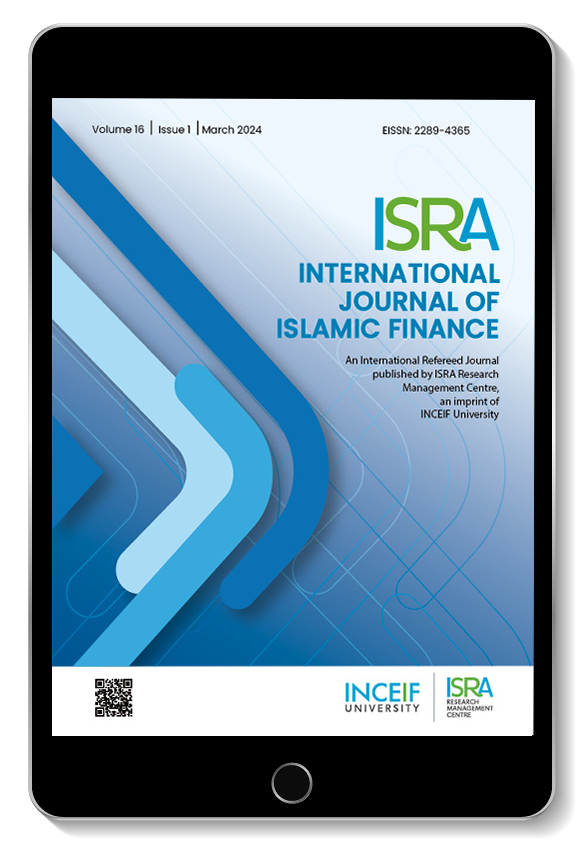Muḍārabah and mushārakah as micro-equity finance: perception of Selangor’s disadvantaged women entrepreneurs
IF 1.4
Q2 BUSINESS, FINANCE
引用次数: 11
Abstract
Purpose This study aims to gain the perception of Selangor’s disadvantaged women on the Sharīʿah (Islamic law) rules on two micro-equity financing instruments, namely, muḍārabah (profit sharing) and mushārakah (profit-and-loss sharing) (M&M). Design/methodology/approach A survey was carried out in the rural area of Selangor district in Malaysia by administering a self-generated structured questionnaire. A total of 330 completed questionnaires were retrieved from the members of an Islamic microfinance institution (IsMFI), namely, Amanah Ikhtiar Malaysia (AIM). The data were analysed by using structural equation modelling. Findings The female borrowers of AIM perceive the Sharīʿah rules of M&M requiring high moral and ethical values and diligent repayment performance. They are aware of some other underlying provisions such as business liquidation, share transfer, information discloser and business termination. The overall findings of this study suggest that the perceived Sharīʿah rules are akin to those that are commonly used in general partnership businesses between Muslims. It also indicates that disadvantaged entrepreneurs would accept the rules that are easy to comprehend as well as favourable to their interests. It further suggests that respondents’ experiences of microfinance and business operation do not have a significant influence on their perception of M&M instruments. Research limitations/implications This study was limited to Selangor. So, the perception of Muslim women surveyed may not represent the views of all women in Malaysia. However, it can offer a primary understanding of the said issue. Practical implications The findings of this study can help IsMIFs take initiatives to offer M&M as micro-equity finance to poor women entrepreneurs. Originality/value So far, limited studies have been carried out on M&M-based microfinancing. This paper offers new insights presenting disadvantaged women entrepreneurs’ perception of these financing instruments.Muḍ作为小额股权融资的ārabah和mushārakah:雪兰莪州弱势女企业家的认知
目的本研究旨在了解雪兰莪州弱势妇女对两种小额股权融资工具Sharīah(伊斯兰法)规则的看法,即ḍārabah(利润分享)和mushārakah(利润和损失分享)(M&M)。设计/方法/方法在马来西亚雪兰莪区的农村地区进行了一项调查,方法是使用自行生成的结构化问卷。从一家伊斯兰小额金融机构(IsMFI)的成员,即马来西亚Amanah Ikhtiar(AIM),共检索到330份已完成的问卷。使用结构方程模型对数据进行了分析。调查结果AIM的女性借款人认为Sharīʿah并购规则要求高道德和伦理价值观以及勤勉的还款表现。他们知道其他一些基本条款,如业务清算、股份转让、信息披露和业务终止。这项研究的总体结果表明,人们认为的Sharīah规则类似于穆斯林之间普通合伙企业中常用的规则。它还表明,处境不利的企业家会接受易于理解且有利于他们利益的规则。它进一步表明,受访者的小额信贷和商业运营经验对他们对并购工具的看法没有显著影响。研究局限性/含义本研究仅限于雪兰莪州。因此,接受调查的穆斯林妇女的看法可能不能代表马来西亚所有妇女的观点。然而,它可以提供对上述问题的初步理解。实际意义这项研究的结果可以帮助IsMIF主动向贫困女企业家提供并购作为小额股权融资。原创性/价值迄今为止,对基于并购的小额融资进行的研究有限。本文提供了新的见解,介绍了处境不利的女企业家对这些融资工具的看法。
本文章由计算机程序翻译,如有差异,请以英文原文为准。
求助全文
约1分钟内获得全文
求助全文
来源期刊

ISRA International Journal of Islamic Finance
BUSINESS, FINANCE-
CiteScore
3.40
自引率
17.40%
发文量
18
审稿时长
20 weeks
期刊介绍:
It is the aspiration of the editorial committee that IJIF achieves the highest rank in quality and substance. It is thus our aim that the journal be carried in the Thompson Reuters’ ISI and Scopus databases. By ensuring high standards in articles published in Islamic finance we ensure that further innovation and research is carried out and promoted in the Islamic finance industry and academia. IJIF publishes 2 issues per annum.
 求助内容:
求助内容: 应助结果提醒方式:
应助结果提醒方式:


